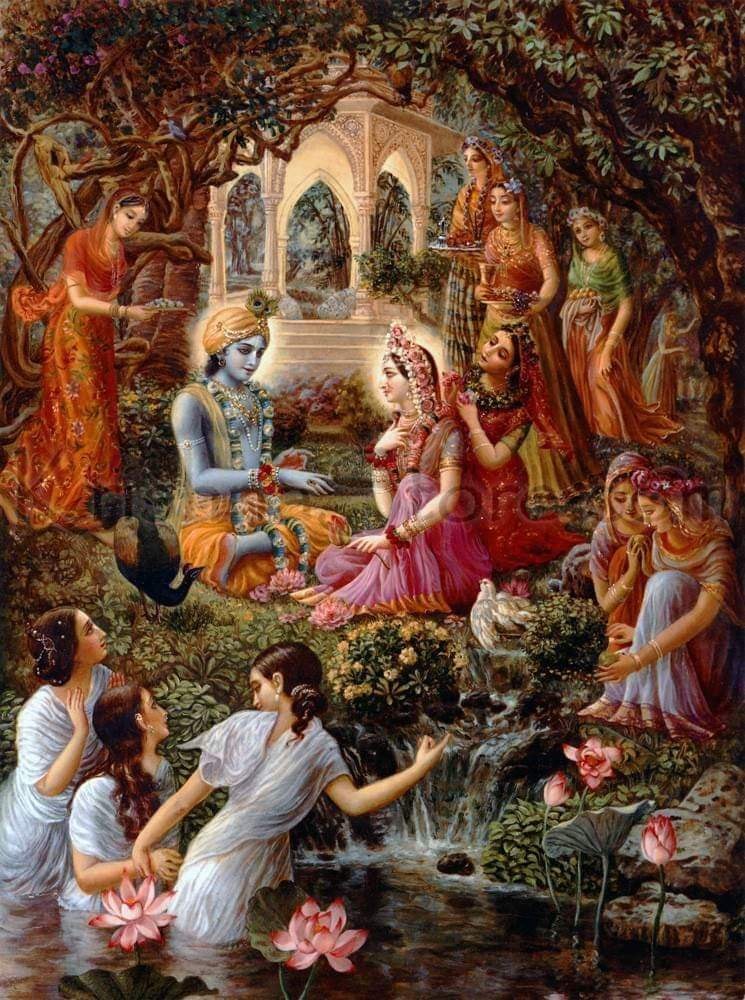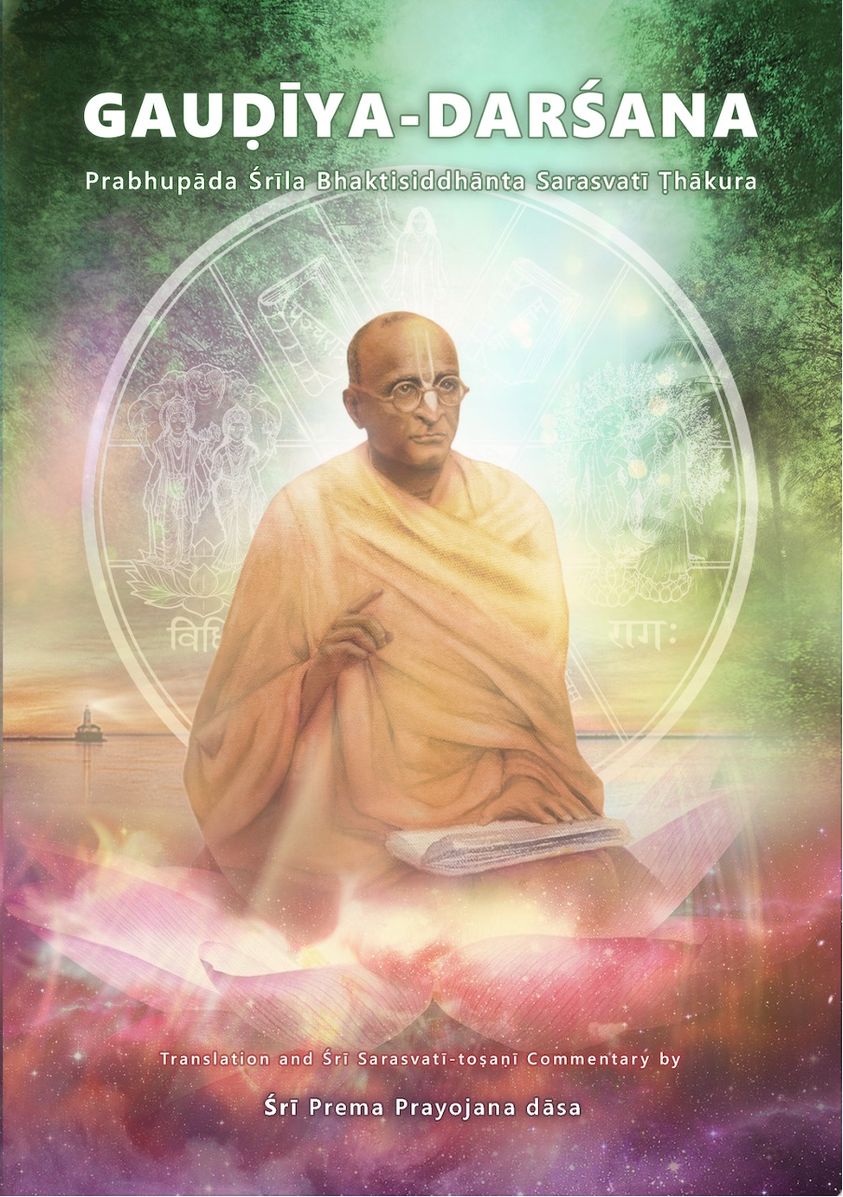
Śrīla Bhaktisiddhānta Sarasvatī Ṭhākura Prabhupāda
By Śrīla Bhaktisiddhānta Sarasvatī Ṭhākura Prabhupāda
Through words, as with their other senses, ordinary men gain knowledge. The languages derived from Brāhmī, Kharoṣṭhī, Sānkī, Puṣkarāsādī and so on are the sources of that knowledge. But such men are guided by secondary meanings, which are more or less different from the primary meanings of words. The desire to attain any manifest object of this world by means of these words should be deemed to be in opposition to the supreme.
Divinity has His existence in the indivisible cognitive principle. Therefore he does not obstruct the enlightening process of words. The modes of investigation represented by the schools that worship Rudra and Brahmā, respectively, are plainly and wholly different from the mode of investigation employed by Vaiṣṇavas. The procedures employed by the former schools are obstructive of indivisible knowledge. It is necessary to consider these speculations with thoroughness and with a dispassionate mind. If we do not do so, a variety of obstacles will arise in regard to the object of meditation, the meditator and the process of meditation. It is necessary to try to remove these obstacles and be rid of them permanently.
It is not reasonable to depend on eclipsed knowledge for the purpose of temporary relief. The sun moves through space in due course of time. If we worship the sun as the true object of our worship, that very worship will be an obstacle to our attainment of indivisible knowledge.
It is not possible to acquaint a person with the nature of the word ‘Kṛṣṇa’ by means of language that is conditioned by the three modes of the phenomenal world. The name Kṛṣṇa is identical with the possessor of the name, the word Kṛṣṇa is identical with the object expressed by the same. Yet the two are also inconceivably distinct from one another. It is necessary to realize the true nature of this inconceivable, simultaneous difference and non-difference. In the meantime, our weak speculation will never enable us to understand the distinctiveness of the inconceivable.
The word ‘quest’ signifies a movement which finally merges into the significance of progressive realization. Until that finality is reached, the object of our ‘quest’ is often allowed to drift away on the tide of our unchecked imagination. In such a case, practicing the process of the true quest becomes unavailable.
In order to avoid such apprehensive detours, it is necessary that the seeker of the Truth feels himself under the Truth’s own protection. When this is so, the process of the quest no longer goes astray from indivisible knowledge, or Vāsudeva Himself. Then also the process of the quest and the activity of realization become one and the same.
The process of the quest involves a goal. There are different words in different languages to signify the real Truth. These words are the products of intellectual speculation. They point to the Truth. But all those terms are subject to knowledge gained through the senses. Therefore they are entities limited by three dimensions. None of those terms can attain to the level of the transcendental entity.
The word ‘Kṛṣṇa’ points to the real Truth. The Truth Himself is not the same as the secondary meaning of His name. The word ‘Kṛṣṇa’ is not used to convey any allegorical sense. The word ‘Kṛṣṇa’, when uttered by a soul who desires the supreme goal, has no room for any meanings that lead to ignorance.
The meaning of a word is narrowed by the eye, the nose, the tongue, the skin and the mind. This narrow meaning expresses something other than Brahman (the great undefined nourishing Principle), Paramātma (the supreme Soul) or Bhagavān (the supreme Person possessed of all power). The word ’Kṛṣṇa’ does not point to any such narrow meaning. Such words as adhokṣaja (transcendental) aprākṛta (non-mundane) and atīndriya (super-sensuous) are the products of negative speculation. By their means it is possible to draw a picture that exists only in the imagination of man.
Such imaginings are different from the real Truth, for they still retain the capacity to produce ignorance, which makes them different from the Truth. The adulterated quality of physical space affects such words. They are thereby separated from the real Entity. They contribute to the elaboration of that entity by the conceptions of the relative and the numerical. The Bṛhadāraṇyaka Upaniṣad speaks of addition, subtraction, multiplication and division of the complete whole. But those processes do not destroy the unity of the whole.
Adapted from The Gaudiya, Volume 26, Number 6
by the Rays of The Harmonist team
![]() Rays of The Harmonist On-line, Year 7, Issue 7, "The Word Krsna Is Not an Allegory" by Srila Bhaktisiddhanta Sarasvati Thakura Prabhupada, is licensed under a Creative Commons Attribution-Share Alike 3.0 Unported License to ensure that it is always freely available. You may redistribute this article if you include this license and attribute it to Rays of The Harmonist.
Rays of The Harmonist On-line, Year 7, Issue 7, "The Word Krsna Is Not an Allegory" by Srila Bhaktisiddhanta Sarasvati Thakura Prabhupada, is licensed under a Creative Commons Attribution-Share Alike 3.0 Unported License to ensure that it is always freely available. You may redistribute this article if you include this license and attribute it to Rays of The Harmonist.

 Posted in
Posted in 







